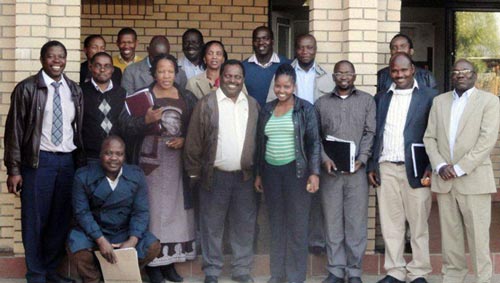With plans to expand to more countries in the region, the Sustainable Intensification of Maize-Legume cropping systems for food security in Eastern and Southern Africa (SIMLESA) program has included Botswana as a spill-over country, reflecting its recognition of the importance of crop-livestock interaction in the farming system. To initiate the spill-over activities, the Australian Centre for International Agricultural Research (ACIAR) has allocated a research grant to Botswana through the CIMMYT-SIMLESA project.
During 23-25 July 2012, SIMLESA project coordinator Mulugetta Mekuria and cropping systems agronomist Isaiah Nyagumbo visited Gaborone, Botswana, to introduce SIMLESA to the Botswana National Agriculture Research System officials and to develop a work plan for the newly funded Spillover project. The project seeks to draw lessons from five core SIMLESA countries and share these with Botswana, Rwanda, Uganda, and South Sudan. It will also carry farming systems characterization studies on sites to be identified for subsequent SIMLESA activities. In Botswana, the primary activities will include exchange visits by Botswana scientists to core SIMLESA countries, surveys and characterization studies, and capacity building through short-term training.
The meeting was attended by more than 20 participants from different research stations in Botswana. Mekuria highlighted the SIMLESA project rationale, objectives, impact pathways, and partnership modalities, and outlined the linkages and synergies between SIMLESA and other CIMMYT projects and programs, including Drought Tolerant Maize for Africa (DTMA), New Seed Initiative for Maize in Southern Africa (NSIMA), and Conservation Agriculture (CA). Nyagumbo then facilitated discussions on the anticipated outcomes of the Spillover project, focusing on the following objectives: developing an understanding of SIMLESA in Botswana, identifying kick-start investigatory activities leading to larger action plans linked to the SIMLESA program, and integrating Botswana scientists into SIMLESA capacity building activities.
The group work and plenary discussions resulted in a draft workplan which will be finalized shortly. According to this plan, the project will focus on CA, crop-livestock linkages, fodder crops production, and multiplication of suitable maize varieties for Botswana’s arid to semi-arid environment. The Botswana team showed a high level of interest in the project, and Stephen Chite, Chief Agricultural Research Officer and Head of arable crops research, expressed his appreciation to CIMMYT for its continued support for the national maize research program and to ACIAR for its financial support.

 Innovations
Innovations 
